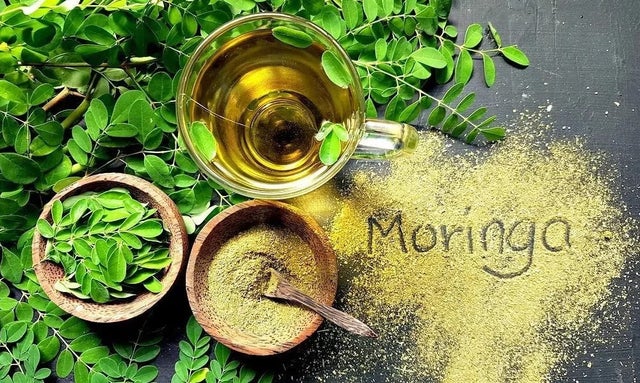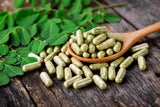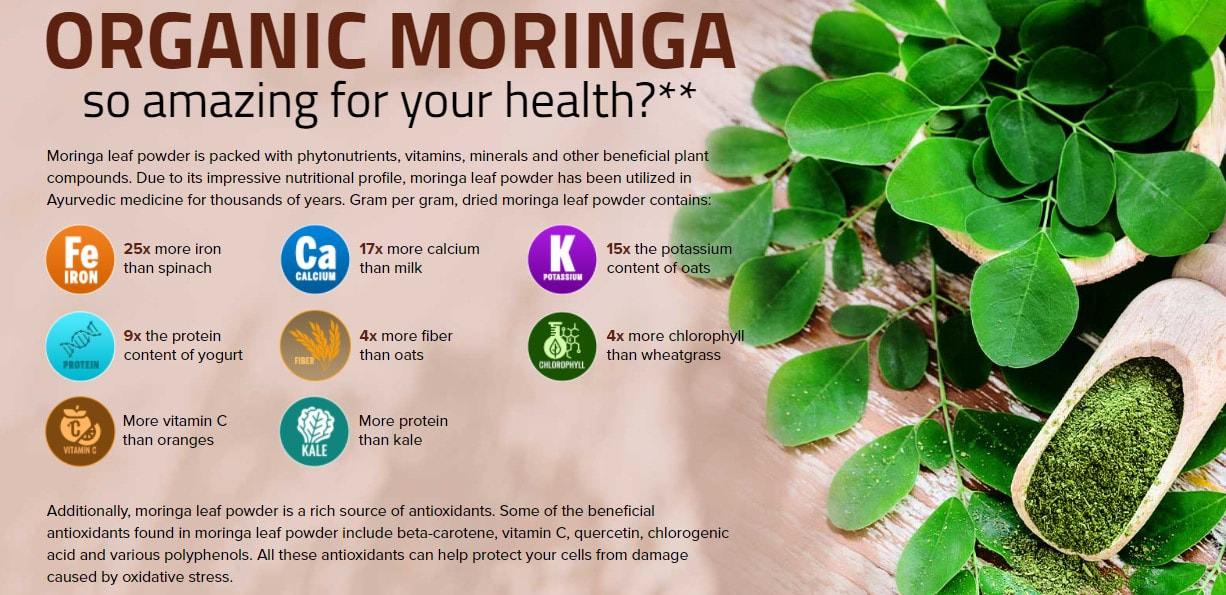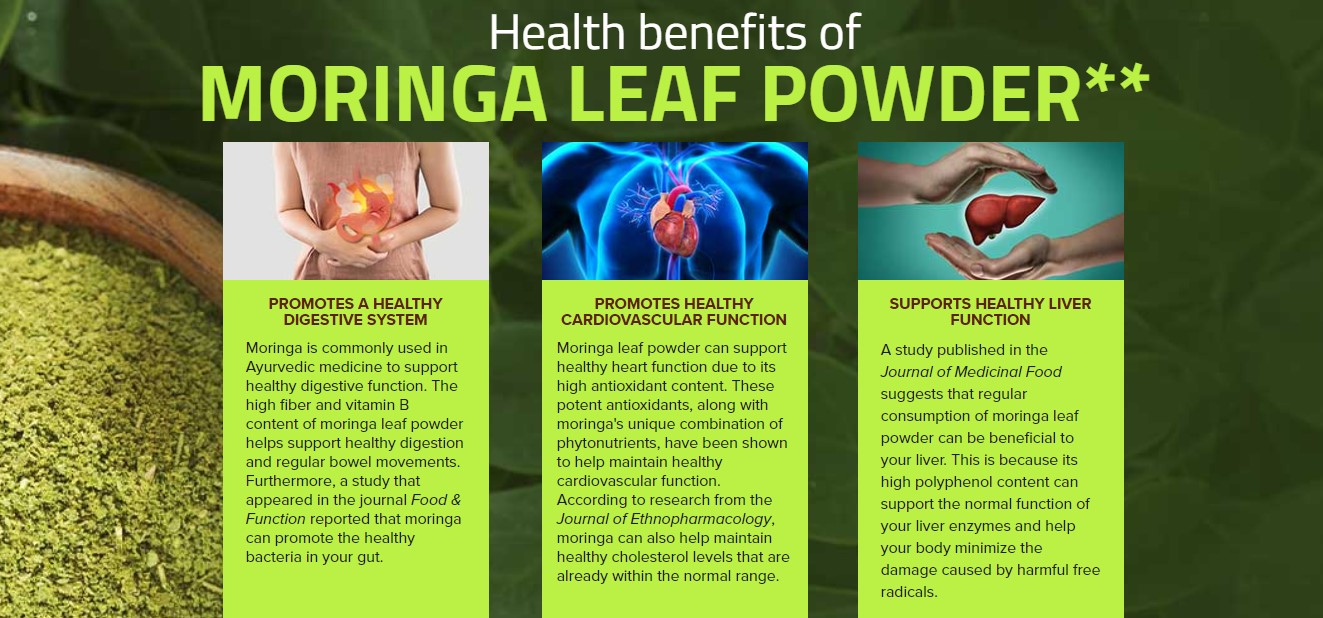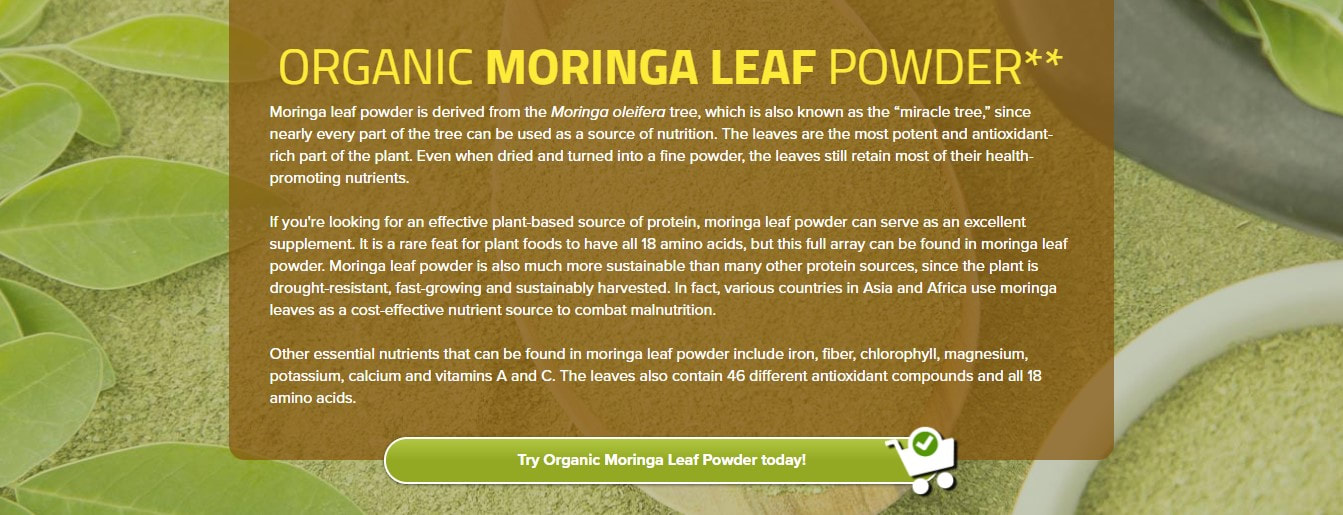Moringa Oleifera Capsules
SKU:
A$20.00
20
160
A$20.00 - A$160.00
Unavailable
per item
Prices Including Free Postage in Australia.
PayPal - If your preferred payment method is PayPal, please checkout on our sister site puregumby.com
100% Pure Organic Moringa Oleifera Powder Capsules x 100 Veg Caps size 00 500mg
Description
100 Capsules of Organic Moringa Dried Leaf Powder
Capsules contain only powdered leaves of the Moringa Oleifera plant with NO additives, fillers or flow agents.
Each capsule contains 500 mg of 100% Moringa Dried Leaf Powder packaged in a Raw Food Gluten Free vegetable capsule.
All Natural, Eco-Friendly, 100% Pure, Organic, Non-GMO, Kosher, Certified Vegan, Gluten-Free, Caffeine-Free, Alcohol-Free. No Added Artificial Ingredients, Flavours or Preservatives.
Best Before Date: 12 months from date of purchase.
RECOMMENDED DOSAGE:
3 capsules = ½ teaspoon Moringa Leaf powder.
½ teaspoon of Moringa Leaf powder = 1,500 mg.
Recommended beginning dosage: ½ teaspoon (3 capsules) daily = 1,500 mg daily.
* Children 1 capsule once daily
PayPal - If your preferred payment method is PayPal, please checkout on our sister site puregumby.com
100% Pure Organic Moringa Oleifera Powder Capsules x 100 Veg Caps size 00 500mg
Description
100 Capsules of Organic Moringa Dried Leaf Powder
Capsules contain only powdered leaves of the Moringa Oleifera plant with NO additives, fillers or flow agents.
Each capsule contains 500 mg of 100% Moringa Dried Leaf Powder packaged in a Raw Food Gluten Free vegetable capsule.
All Natural, Eco-Friendly, 100% Pure, Organic, Non-GMO, Kosher, Certified Vegan, Gluten-Free, Caffeine-Free, Alcohol-Free. No Added Artificial Ingredients, Flavours or Preservatives.
Best Before Date: 12 months from date of purchase.
RECOMMENDED DOSAGE:
3 capsules = ½ teaspoon Moringa Leaf powder.
½ teaspoon of Moringa Leaf powder = 1,500 mg.
Recommended beginning dosage: ½ teaspoon (3 capsules) daily = 1,500 mg daily.
* Children 1 capsule once daily
The moringa plant has been around for 4,000 years and has a long history of use in traditional medicine due to its potent health-promoting properties. Today, many scientists believe that moringa is one of the most nutrient-dense superfoods ever discovered.
Moringa leaf powder is derived from the Moringa oleifera tree, which is also known as the “miracle tree,” since nearly every part of the tree can be used as a source of nutrition. The leaves are the most potent and antioxidant-rich part of the plant. Even when dried and turned into a fine powder, the leaves still retain most of their health-promoting nutrients.
If you're looking for an effective plant-based source of protein, moringa leaf powder can serve as an excellent supplement. It is a rare feat for plant foods to have all 18 amino acids, but this full array can be found in moringa leaf powder. Moringa leaf powder is also much more sustainable than many other protein sources, since the plant is drought-resistant, fast-growing and sustainably harvested. In fact, various countries in Asia and Africa use moringa leaves as a cost-effective nutrient source to combat malnutrition.
Other essential nutrients that can be found in moringa leaf powder include iron, fiber, chlorophyll, magnesium, potassium, calcium and vitamins A and C. The leaves also contain 46 different antioxidant compounds and all 18 amino acids.
Moringa leaf powder is derived from the Moringa oleifera tree, which is also known as the “miracle tree,” since nearly every part of the tree can be used as a source of nutrition. The leaves are the most potent and antioxidant-rich part of the plant. Even when dried and turned into a fine powder, the leaves still retain most of their health-promoting nutrients.
If you're looking for an effective plant-based source of protein, moringa leaf powder can serve as an excellent supplement. It is a rare feat for plant foods to have all 18 amino acids, but this full array can be found in moringa leaf powder. Moringa leaf powder is also much more sustainable than many other protein sources, since the plant is drought-resistant, fast-growing and sustainably harvested. In fact, various countries in Asia and Africa use moringa leaves as a cost-effective nutrient source to combat malnutrition.
Other essential nutrients that can be found in moringa leaf powder include iron, fiber, chlorophyll, magnesium, potassium, calcium and vitamins A and C. The leaves also contain 46 different antioxidant compounds and all 18 amino acids.
In 2008 the National Institute of Health called moringa (moringa oleifera) the “plant of the year,” acknowledging that “perhaps like no other single species, this plant has the potential to help reverse multiple major environmental problems and provide for many unmet human needs.”
What are the health benefits of moringa? To date, over 1,300 studies, articles and reports have focused on moringa benefits, finding that it contains compounds that are especially important in parts of the world where disease outbreak and nutritional deficiencies are common.
Research shows that just about every part of the moringa plant can be utilized in some way, whether it’s to make a potent antioxidant tea or produce an oily substance that lubricates and nourishes the skin.
What Is Moringa?Moringa (moringa oleifera) is known by over 100 names in different languages around the world. This easy-to-grow tropical plant species, native to the Himalayan mountains and parts of India and Africa, comes packed with over 90 protective compounds, including isothiocyanates, flavonoids and phenolic acids.
There are actually believed to be at least a dozen different varieties of the moringa tree, which belong to the plant family Moringaceae. These are fast-growing, tall, leafy plants that produce flowers or pods.
Of all the species, one (moringa oleifera) is by far the most utilized.
Prior to the plant’s effects being demonstrated in scientific studies, it was used extensively in traditional medicine practices like Ayurveda medicine for over 4,000 years.
Moringa has gained a reputation for fighting inflammation and combating various effects of malnutrition and aging, earning the nickname “the miracle plant.”
Benefits of moringa include helping treat a wide variety of conditions, such as:
The most popular medicinal use of this plant involves drying and grinding down moringa leaves, where most of the antioxidants are found.
Studies have revealed that moringa powder is loaded with phytochemicals, protein, calcium, beta-carotene, vitamin C and potassium. Because it provides a concentrated source of vitamin A, it’s given to thousands of children in third-world countries every year suffering from life-threatening vitamin A deficiency, which is linked to impaired immune function.
Consuming it can also improve intake of trace minerals, amino acids and phenolic compounds. The plant contains a rare and unique combination of disease-preventing phytonutrients, including flavonoids, glucosides, glucosinolates, zeatin, quercetin, beta-sitosterol, caffeoylquinic acid and kaempferol.
Top 7 Moringa Benefits1. Provides Antioxidants and Anti-Inflammatory Compounds
Moringa oleifera seems to have similar abilities as certain conventional drugs, only it doesn’t pose the same level of risk for experiencing side effects.
According to a report published in the Asian Pacific Journal of Cancer Prevention, it contains a mix of essential amino acids (the building blocks of proteins), carotenoid phytonutrients (the same kinds found in plants like carrots and tomatoes), antioxidants, such as quercetin, and natural antibacterial compounds that work in the same way as many anti-inflammatory drugs.
Studies have shown that these compounds are protective of the heart, natural circulatory stimulants, and possess antitumor, anti-epileptic, anti-ulcer, antispasmodic, antihypertensive and antidiabetic effects.
Moringa powder is high in several powerful anti-aging compounds that lower the effects of free radicals, oxidative stress and inflammation. These are associated with a reduced risk for chronic diseases, such as stomach, lung or colon cancer; diabetes; hypertension; and age-related eye disorders.
2. Balances Hormones and Slows the Effects of Aging
A 2014 study published in the Journal of Food Science and Technology tested the effects of moringa (sometimes also called “drumstick”) along with amaranth leaves (Amaranthus tricolor) on levels of inflammation and oxidative stress in menopausal adult women. Researchers wanted to investigate if these superfoods could help slow the effects of aging by balancing hormones naturally.
Levels of antioxidant status, including serum retinol, serum ascorbic acid, glutathione peroxidase, superoxide dismutase and malondialdehyde, were analyzed before and after supplementation, along with fasting blood glucose and haemoglobin levels.
Results showed that supplementing with moringa and amaranth caused significant increases in antioxidant status along with significant decreases in markers of oxidative stress. Better fasting blood glucose control and positive increases in haemoglobin were also found.
Can moringa help you sexually? There’s some evidence it may boost libido and work like a natural birth control compound, according to some animal studies.
Although it’s historically been used as a natural aphrodisiac, it actually seems to help reduce rates of conception. That said, it can boost the immune system during pregnancy and also increase breast milk production/lactation, according to some studies.
3. Helps Improve Digestive Health
Due to its anti-inflammatory properties, moringa has been used in ancient systems of medicine, such as Ayurveda, to prevent or treat stomach ulcers, liver disease, kidney damage, fungal or yeast infections (such as candida), digestive complaints, and infections.
A common use of moringa oil is helping to boost liver function, therefore detoxifying the body of harmful substances, such as heavy metal toxins. It might also be capable of helping fight kidney stones, urinary tract infections, constipation, fluid retention/edema and diarrhea.
4. Balances Blood Sugar Levels, Helping Fight Diabetes
Moringa contains a type of acid called chlorogenic acid, which has been shown to help control blood sugar levels and allow cells to take up or release glucose (sugar) as needed. This gives it natural antidiabetic and hormone-balancing properties.
Aside from chloregnic acid, compounds called isothiocyanates that are present in moringa leaf have also been tied to natural protection against diabetes.
A study that appeared in the International Journal of Food Science Technology found that this plant had positive effects on blood sugar control and insulin levels in patients with diabetes when eaten as part of a high-carbohydrate meal.
Separate studies have demonstrated that antidiabetic activities of low doses of moringa seed powder (50–100 milligrams per kilogram body weight) help increase antioxidant status and enzyme production within the liver, pancreas and kidneys of rats and prevent damage compared to control groups.
High levels of immunoglobulin (IgA, IgG), fasting blood sugar and glycosylated hemoglobin (HbA1c) — three markers seen in diabetics — were also found to decrease as a result of moringa given to rats with diabetes.
Can moringa help you lose weight? Because it can improve insulin sensitivity and hormone balance, it may offer some advantages to those following a weight loss plan.
5. Protects and Nourishes the Skin
Several popular uses of moringa oil are to help retain skin’s moisture, speed up wound healing, and soothe dry or burnt skin.
Moringa contains natural antibacterial, antifungal and antiviral compounds that protect the skin from various forms of infections. Some of the common ways it is used on the skin include reducing athlete’s foot, eliminating odors, reducing inflammation associated with acne breakouts, treating pockets of infection or abscesses, getting rid of dandruff, fighting gum disease (gingivitis), and helping heal bites, burns, viral warts and wounds.
The oil is applied directly to the skin as a drying, astringent agent used to kill bacteria, but at the same time, when used regularly it’s known to act like a lubricant and hydrate the skin by restoring its natural moisture barrier. It’s a common ingredient used in food manufacturing and perfumes because it prevents spoilage by killing bacteria — plus it has a pleasant smell and reduces odors.
6. Helps Stabilize Your Mood and Protects Brain Health
As a high-protein food and a rich source of the amino acid tryptophan, moringa supports neurotransmitter functions, including those that produce the “feel good” hormone serotonin.
It’s also rich in antioxidants and compounds that may improve thyroid health, which makes it beneficial for maintaining high energy levels plus fighting fatigue, depression, low libido, moods swings and insomnia.
7. Good for the Environment (Water and Topsoil)
A noteworthy characteristic of the moringa plant is that it’s capable of growing in depleted or dry soils where many other types of beneficial plants or trees cannot survive. This is precisely why certain undernourished populations living in third-world countries, such as Somalia or India, have benefited from it during times of famine.
Aside from providing important nutrients, it is used to help restore fertile soil, aid in forest restoration efforts and filter water.
One interesting use of the seeds is for water purification. Combining moringa with water helps impurities cling to the seeds so they can be removed, leaving behind better quality water that’s lower in toxins.
Salt also seems to bind to moringa, which is beneficial for producing fresh-tasting water.
Some studies have shown that 0.2 grams of ground moringa seed can turn one liter of contaminated water into safe drinking water. This is due to the coagulating actions of certain ingredients in the plant that absorb bacteria.
Risks and Side EffectsWhat are the side effects of taking moringa? Because it’s completely natural and free from chemical additives (when you buy a pure, high-quality brand), when taken by mouth or used on the skin it seems to be very well-tolerated.
Moringa side effects are still possible and may include:
During pregnancy or when breastfeeding, it’s best to avoid moringa extract, root or high doses of supplements since not enough research has been done to show it’s safe. It’s possible that chemicals within the plant’s root, bark and flowers can lead to contractions of the uterus, which can cause complications during pregnancy.
How to Use ItAs you can probably tell by now, this plant can be used in many different ways in order to utilize all the available moringa benefits. Because of the long transport time needed to ship moringa from parts of Africa or Asia where it’s grown, in the U.S. it’s usually sold in powder or capsule form, which prolongs its shelf life.
An interesting characteristic of moringa? It’s said to taste like a mix between horseradish and asparagus. It might not have the most appealing flavor, but it’s a supplement with one of the the richest supplies of vital nutrients in the world.
Dosage Recommendations
There’s no recommended or required dosage of moringa at this time since it’s only an herbal supplement and not an essential nutrient. That said, there’s some evidence that the optimum dose for humans has been calculated to be 29 milligrams per kilogram of body weight.
It’s recommended that you start by taking half a teaspoon of dried moringa orally per day for three to five days, increasing your intake slowly over two weeks as you get acclimated to its effects.
Most people choose to take moringa every several days but not every single day for long duration of time, since it can can cause laxative effects and an upset stomach when overused.
What are the health benefits of moringa? To date, over 1,300 studies, articles and reports have focused on moringa benefits, finding that it contains compounds that are especially important in parts of the world where disease outbreak and nutritional deficiencies are common.
Research shows that just about every part of the moringa plant can be utilized in some way, whether it’s to make a potent antioxidant tea or produce an oily substance that lubricates and nourishes the skin.
What Is Moringa?Moringa (moringa oleifera) is known by over 100 names in different languages around the world. This easy-to-grow tropical plant species, native to the Himalayan mountains and parts of India and Africa, comes packed with over 90 protective compounds, including isothiocyanates, flavonoids and phenolic acids.
There are actually believed to be at least a dozen different varieties of the moringa tree, which belong to the plant family Moringaceae. These are fast-growing, tall, leafy plants that produce flowers or pods.
Of all the species, one (moringa oleifera) is by far the most utilized.
Prior to the plant’s effects being demonstrated in scientific studies, it was used extensively in traditional medicine practices like Ayurveda medicine for over 4,000 years.
Moringa has gained a reputation for fighting inflammation and combating various effects of malnutrition and aging, earning the nickname “the miracle plant.”
Benefits of moringa include helping treat a wide variety of conditions, such as:
- inflammation-related diseases
- cancer
- diabetes
- anemia
- low energy and fatigue
- arthritis and other joint pain, such as rheumatism
- allergies and asthma
- constipation, stomach pains and and diarrhea
- epilepsy
- stomach and intestinal ulcers or spasms
- chronic headaches
- heart problems, including high blood pressure
- kidney stones
- fluid retention
- thyroid disorders
- low sex drive
- bacterial, fungal, viral and parasitic infections
The most popular medicinal use of this plant involves drying and grinding down moringa leaves, where most of the antioxidants are found.
Studies have revealed that moringa powder is loaded with phytochemicals, protein, calcium, beta-carotene, vitamin C and potassium. Because it provides a concentrated source of vitamin A, it’s given to thousands of children in third-world countries every year suffering from life-threatening vitamin A deficiency, which is linked to impaired immune function.
Consuming it can also improve intake of trace minerals, amino acids and phenolic compounds. The plant contains a rare and unique combination of disease-preventing phytonutrients, including flavonoids, glucosides, glucosinolates, zeatin, quercetin, beta-sitosterol, caffeoylquinic acid and kaempferol.
Top 7 Moringa Benefits1. Provides Antioxidants and Anti-Inflammatory Compounds
Moringa oleifera seems to have similar abilities as certain conventional drugs, only it doesn’t pose the same level of risk for experiencing side effects.
According to a report published in the Asian Pacific Journal of Cancer Prevention, it contains a mix of essential amino acids (the building blocks of proteins), carotenoid phytonutrients (the same kinds found in plants like carrots and tomatoes), antioxidants, such as quercetin, and natural antibacterial compounds that work in the same way as many anti-inflammatory drugs.
Studies have shown that these compounds are protective of the heart, natural circulatory stimulants, and possess antitumor, anti-epileptic, anti-ulcer, antispasmodic, antihypertensive and antidiabetic effects.
Moringa powder is high in several powerful anti-aging compounds that lower the effects of free radicals, oxidative stress and inflammation. These are associated with a reduced risk for chronic diseases, such as stomach, lung or colon cancer; diabetes; hypertension; and age-related eye disorders.
2. Balances Hormones and Slows the Effects of Aging
A 2014 study published in the Journal of Food Science and Technology tested the effects of moringa (sometimes also called “drumstick”) along with amaranth leaves (Amaranthus tricolor) on levels of inflammation and oxidative stress in menopausal adult women. Researchers wanted to investigate if these superfoods could help slow the effects of aging by balancing hormones naturally.
Levels of antioxidant status, including serum retinol, serum ascorbic acid, glutathione peroxidase, superoxide dismutase and malondialdehyde, were analyzed before and after supplementation, along with fasting blood glucose and haemoglobin levels.
Results showed that supplementing with moringa and amaranth caused significant increases in antioxidant status along with significant decreases in markers of oxidative stress. Better fasting blood glucose control and positive increases in haemoglobin were also found.
Can moringa help you sexually? There’s some evidence it may boost libido and work like a natural birth control compound, according to some animal studies.
Although it’s historically been used as a natural aphrodisiac, it actually seems to help reduce rates of conception. That said, it can boost the immune system during pregnancy and also increase breast milk production/lactation, according to some studies.
3. Helps Improve Digestive Health
Due to its anti-inflammatory properties, moringa has been used in ancient systems of medicine, such as Ayurveda, to prevent or treat stomach ulcers, liver disease, kidney damage, fungal or yeast infections (such as candida), digestive complaints, and infections.
A common use of moringa oil is helping to boost liver function, therefore detoxifying the body of harmful substances, such as heavy metal toxins. It might also be capable of helping fight kidney stones, urinary tract infections, constipation, fluid retention/edema and diarrhea.
4. Balances Blood Sugar Levels, Helping Fight Diabetes
Moringa contains a type of acid called chlorogenic acid, which has been shown to help control blood sugar levels and allow cells to take up or release glucose (sugar) as needed. This gives it natural antidiabetic and hormone-balancing properties.
Aside from chloregnic acid, compounds called isothiocyanates that are present in moringa leaf have also been tied to natural protection against diabetes.
A study that appeared in the International Journal of Food Science Technology found that this plant had positive effects on blood sugar control and insulin levels in patients with diabetes when eaten as part of a high-carbohydrate meal.
Separate studies have demonstrated that antidiabetic activities of low doses of moringa seed powder (50–100 milligrams per kilogram body weight) help increase antioxidant status and enzyme production within the liver, pancreas and kidneys of rats and prevent damage compared to control groups.
High levels of immunoglobulin (IgA, IgG), fasting blood sugar and glycosylated hemoglobin (HbA1c) — three markers seen in diabetics — were also found to decrease as a result of moringa given to rats with diabetes.
Can moringa help you lose weight? Because it can improve insulin sensitivity and hormone balance, it may offer some advantages to those following a weight loss plan.
5. Protects and Nourishes the Skin
Several popular uses of moringa oil are to help retain skin’s moisture, speed up wound healing, and soothe dry or burnt skin.
Moringa contains natural antibacterial, antifungal and antiviral compounds that protect the skin from various forms of infections. Some of the common ways it is used on the skin include reducing athlete’s foot, eliminating odors, reducing inflammation associated with acne breakouts, treating pockets of infection or abscesses, getting rid of dandruff, fighting gum disease (gingivitis), and helping heal bites, burns, viral warts and wounds.
The oil is applied directly to the skin as a drying, astringent agent used to kill bacteria, but at the same time, when used regularly it’s known to act like a lubricant and hydrate the skin by restoring its natural moisture barrier. It’s a common ingredient used in food manufacturing and perfumes because it prevents spoilage by killing bacteria — plus it has a pleasant smell and reduces odors.
6. Helps Stabilize Your Mood and Protects Brain Health
As a high-protein food and a rich source of the amino acid tryptophan, moringa supports neurotransmitter functions, including those that produce the “feel good” hormone serotonin.
It’s also rich in antioxidants and compounds that may improve thyroid health, which makes it beneficial for maintaining high energy levels plus fighting fatigue, depression, low libido, moods swings and insomnia.
7. Good for the Environment (Water and Topsoil)
A noteworthy characteristic of the moringa plant is that it’s capable of growing in depleted or dry soils where many other types of beneficial plants or trees cannot survive. This is precisely why certain undernourished populations living in third-world countries, such as Somalia or India, have benefited from it during times of famine.
Aside from providing important nutrients, it is used to help restore fertile soil, aid in forest restoration efforts and filter water.
One interesting use of the seeds is for water purification. Combining moringa with water helps impurities cling to the seeds so they can be removed, leaving behind better quality water that’s lower in toxins.
Salt also seems to bind to moringa, which is beneficial for producing fresh-tasting water.
Some studies have shown that 0.2 grams of ground moringa seed can turn one liter of contaminated water into safe drinking water. This is due to the coagulating actions of certain ingredients in the plant that absorb bacteria.
Risks and Side EffectsWhat are the side effects of taking moringa? Because it’s completely natural and free from chemical additives (when you buy a pure, high-quality brand), when taken by mouth or used on the skin it seems to be very well-tolerated.
Moringa side effects are still possible and may include:
- lower blood pressure
- slowed heart rate
- uterine contractions
- cell mutations when high amounts of seeds are consumed
- interference with fertility
During pregnancy or when breastfeeding, it’s best to avoid moringa extract, root or high doses of supplements since not enough research has been done to show it’s safe. It’s possible that chemicals within the plant’s root, bark and flowers can lead to contractions of the uterus, which can cause complications during pregnancy.
How to Use ItAs you can probably tell by now, this plant can be used in many different ways in order to utilize all the available moringa benefits. Because of the long transport time needed to ship moringa from parts of Africa or Asia where it’s grown, in the U.S. it’s usually sold in powder or capsule form, which prolongs its shelf life.
An interesting characteristic of moringa? It’s said to taste like a mix between horseradish and asparagus. It might not have the most appealing flavor, but it’s a supplement with one of the the richest supplies of vital nutrients in the world.
Dosage Recommendations
There’s no recommended or required dosage of moringa at this time since it’s only an herbal supplement and not an essential nutrient. That said, there’s some evidence that the optimum dose for humans has been calculated to be 29 milligrams per kilogram of body weight.
It’s recommended that you start by taking half a teaspoon of dried moringa orally per day for three to five days, increasing your intake slowly over two weeks as you get acclimated to its effects.
Most people choose to take moringa every several days but not every single day for long duration of time, since it can can cause laxative effects and an upset stomach when overused.
- Dried moringa leaves or moringa powder: It takes roughly seven pounds of moringa leaves to make one pound of dried moringa powder. The leaves are considered the most potent parts of the plant, containing the most antioxidants and available macronutrients. Follow dosage directions carefully, taking up to six grams daily for up to three weeks at a time (which has been shown to be safe, according to studies).
CONTENTS OF MORINGA in a Nutshell
One of the foremost advocates of Moringa is Dr Monica G.Marcu Pharm.D. PH.D.
Monica shares FACTS about Moringa from Her Book “Miracle Tree” .......
Quote – Rare for a plant source, Moringa leaves contain all the essential amino acids to build strong healthy bodies.
In addition Moringa has the following attributes -
• 92 Nutrients
• 46 Antioxidants
• 36 Anti-Inflammatory agents
• 18 Amino Acids, 9 Essential Amino Acids
• Nourishes The Immune System
• Promotes Healthy Circulation
• Supports Normal Glucose Levels
• Natural Anti-Aging Benefits
• Provides Anti-Inflammatory Support
• Promotes Healthy Digestion
• Promotes Heightened Mental Clarity
• Boosts Energy Without Caffeine
• Encourages Balanced Metabolism
• Promotes Softer Skin
• Provides Relief From Acne
• Supports Normal Hormone Levels
Examples of some few nutritional value of Moringa Gram-for-gram comparison of nutritional data
• 2 times -the Protein of Yogurt
• 3 times – the Potassium of Bananas
• 4 times – the Calcium of Milk
• 4 times – the Vitamin A of Carrots
• 7 times -the Vitamin C of Oranges
End Quote.
These are some of the contents of Moringa Oleifera.
ANTI-INFLAMMATORY COMPOUNDS OF MORINGA - Vitamin A, Vitamin B1 (Thiamin), Vitamin C, Vitamin E, Arginine, Beta-sitosterol, Caffeoylquinic Acid, Calcium, Chlorophyll, Copper, Cystine, Omega 3, Omega 6, Omega 9, Fiber, Glutathione, Histidine, Indole Acetic Acid, Indoleacetonitrile, Isoleucine, Kaempferal, Leucine, Magnesium, Oleic-Acid, Phenylalanine, Potassium, Quercetin, Rutin, Selenium, Stigmasterol, Sulfur, Tryptophan, Tyrosine, Zinc, ........
.... and ZEATIN (A study published in Rejuvenation Research shows the undeniable youth-preserving effects of Zeatin are due to its ability to regulate cell division & growth, plus delay cell aging. With Moringa's Zeatin, new skin cells grow at a faster rate than old skin cells die. This results in a marked reduction of look and feel of wrinkles on the face and other parts of the body, and a more youthful skin appearance)
.... & Moringa contains "Several Thousand Times More Zeatin Than Any Other Known Plant "
ANTI-OXIDANTS FOUND IN MORINGA - Vitamin A, Vitamin C, Vitamin E, Vitamin K, Vitamin B (Choline), Vitamin B1 (Thiamin), Vitamin B2 (Riboflavin), Vitamin B3 (Niacin), Vitamin B6, Vitamin B12 Cobalamin), Alanine, Alpha-Carotene, Arginine, Beta-Carotene, Beta-sitosterol, Caffeoylquinic Acid, Campesterol, Carotenoids, Chlorophyll, Chromium, Delta-5-Avenasterol, Delta-7-Avenasterol, Glutathione, Histidine, Indole Acetic Acid, Indoleacetonitrile, Kaempferal, Leucine, Lutein, Methionine, Myristic-Acid, Palmitic-Acid, Prolamine, Proline, Quercetin, Rutin, Selenium, Threonine, Tryptophan, Xanthins, Xanthophyll, Zeatin, Zeaxanthin, Zinc
ESSENTIAL AMINO ACIDS - Isoleucine - Leucine - Lysine – Methionine - Phenylalaine - Threonine - Tryptophan - Valine
NON-ESSENTIAL AMINO ACIDS - Alanine - Arginine - Aspartic Acid - Cystine - Glutamic Acid - Glycine - Histidine - Serine - Proline
SOME OTHER NUTRIENTS - Vitamins B5, B12, D, E, Chlorophyll, Selenium, Superoxide Dismutase, Xanthins, Xanthophyll, Zinc, Lutein, Neoxanthin, Violaxanthin, Fiber, Flavonoids, Folate (Folic Acid), Iodine, Iron, Molybdenum, Phosphorus, Arachidic-Acid, Behenic-Acid, Gadoleic Acid, Lignoceric Acid, Myristic Acid, Palmitic-Acid, Palrnitoleic Acid, Stearic-Acid, 4-(A lpha-L -Rhamnosyloxy)-Benzylglucosinolate, 4-(Alpha -L-Rhamnosyloxy), Senzylisothiocyanate; Niazinin A, Niazinin B, Niaziminins A & B, Niazimicin, 28-Isoavenasterol, Brassicasterol, Campestanol, Campesterol, Cholesterol, Clerosterol, Delta-5-Avenasterol, Delta-7, 14-Stigmastanol, Delta-7-Avenasterol, Ergostadienol
All Omegas 3, 6, & 9
Moringa contains the full spectrum of monounsaturated and polyunsaturated fatty acids, known as the omegas. In fact, ounce for ounce, dried Moringa leaves contain 10 times the omega 3's found in salmon
Omega 3 is an essential fatty acid that plays an important role in cell health, blood clotting, immune function, and in reducing inflammation throughout the body - in blood vessels, joints, and elsewhere. Eating foods rich in omega 3 fatty acids can help lower the risk of diseases such as heart disease, rheumatoid arthritis, stroke, cancer, depression, as well as lower LDL or “bad” cholesterol. omega 3s, like omega 6s, cannot be produced in the body; they must be obtained by dietary sources. .
Omega 6 is an essential fatty acid thought to reduce the risk of heart disease, lower total cholesterol levels, specifically targeting “bad” LDL cholesterol, while raising “good” HDL cholesterol levels. Omega 6 may also reduce the risk of some forms of cancer.
Omega 9 fatty acids, commonly known as monounsaturated fatty acids, offer important health benefits. Research has shown that Omega 9s are protective against metabolic syndrome and cardiovascular disease. Because Omega 9 fatty acids have been shown to increase HDL (“good”) cholesterol and decrease LDL (“bad”) cholesterol, they play an important role in reducing plaque buildup in the arteries, reducing the risk of heart attack and stroke.
_____________________________________________________________
Here are some medicinal BIOCHEMICAL ACTIONS Moringa is believed to provide to the body:
Antiulcer (9 actions)
Vasodilator (9 actions)
Hypocholesterolemic (14 actions)
Antitumor (10 actions)
Cancer-preventive (19 actions)
Pesticide (13 actions)
Anti-viral (9 actions)
Hypotensive (9 actions)
Diuretic (8 actions)
Fungicide (8 actions)
Antiseptic (7 actions)
Hepatoprotective (7 actions)
Anti-asthmatic (6 actions)
Anti-parkinsonian (7 actions)
Laxative (5 actions)
Anti-atherosclerotic (6 actions)
Anxi-olytic (6 actions)
Hypoglycemic (5 actions)
Anti-herpetic (6 actions)
Anti-histaminic (5 actions)
Anti-rheumatic (5 actions)
Anti-fatigue (5 actions)
Anti-menopausal (4 actions)
Anti-prostatitic (4 actions)
Anti-depressant (8 actions)
Cardio-protective (8 actions)
Anti-osteoporotic (5 actions)
Sedative (4 actions)
In the future, more discoveries may be added as additional studies are performed.
One of the foremost advocates of Moringa is Dr Monica G.Marcu Pharm.D. PH.D.
Monica shares FACTS about Moringa from Her Book “Miracle Tree” .......
Quote – Rare for a plant source, Moringa leaves contain all the essential amino acids to build strong healthy bodies.
In addition Moringa has the following attributes -
• 92 Nutrients
• 46 Antioxidants
• 36 Anti-Inflammatory agents
• 18 Amino Acids, 9 Essential Amino Acids
• Nourishes The Immune System
• Promotes Healthy Circulation
• Supports Normal Glucose Levels
• Natural Anti-Aging Benefits
• Provides Anti-Inflammatory Support
• Promotes Healthy Digestion
• Promotes Heightened Mental Clarity
• Boosts Energy Without Caffeine
• Encourages Balanced Metabolism
• Promotes Softer Skin
• Provides Relief From Acne
• Supports Normal Hormone Levels
Examples of some few nutritional value of Moringa Gram-for-gram comparison of nutritional data
• 2 times -the Protein of Yogurt
• 3 times – the Potassium of Bananas
• 4 times – the Calcium of Milk
• 4 times – the Vitamin A of Carrots
• 7 times -the Vitamin C of Oranges
End Quote.
These are some of the contents of Moringa Oleifera.
ANTI-INFLAMMATORY COMPOUNDS OF MORINGA - Vitamin A, Vitamin B1 (Thiamin), Vitamin C, Vitamin E, Arginine, Beta-sitosterol, Caffeoylquinic Acid, Calcium, Chlorophyll, Copper, Cystine, Omega 3, Omega 6, Omega 9, Fiber, Glutathione, Histidine, Indole Acetic Acid, Indoleacetonitrile, Isoleucine, Kaempferal, Leucine, Magnesium, Oleic-Acid, Phenylalanine, Potassium, Quercetin, Rutin, Selenium, Stigmasterol, Sulfur, Tryptophan, Tyrosine, Zinc, ........
.... and ZEATIN (A study published in Rejuvenation Research shows the undeniable youth-preserving effects of Zeatin are due to its ability to regulate cell division & growth, plus delay cell aging. With Moringa's Zeatin, new skin cells grow at a faster rate than old skin cells die. This results in a marked reduction of look and feel of wrinkles on the face and other parts of the body, and a more youthful skin appearance)
.... & Moringa contains "Several Thousand Times More Zeatin Than Any Other Known Plant "
ANTI-OXIDANTS FOUND IN MORINGA - Vitamin A, Vitamin C, Vitamin E, Vitamin K, Vitamin B (Choline), Vitamin B1 (Thiamin), Vitamin B2 (Riboflavin), Vitamin B3 (Niacin), Vitamin B6, Vitamin B12 Cobalamin), Alanine, Alpha-Carotene, Arginine, Beta-Carotene, Beta-sitosterol, Caffeoylquinic Acid, Campesterol, Carotenoids, Chlorophyll, Chromium, Delta-5-Avenasterol, Delta-7-Avenasterol, Glutathione, Histidine, Indole Acetic Acid, Indoleacetonitrile, Kaempferal, Leucine, Lutein, Methionine, Myristic-Acid, Palmitic-Acid, Prolamine, Proline, Quercetin, Rutin, Selenium, Threonine, Tryptophan, Xanthins, Xanthophyll, Zeatin, Zeaxanthin, Zinc
ESSENTIAL AMINO ACIDS - Isoleucine - Leucine - Lysine – Methionine - Phenylalaine - Threonine - Tryptophan - Valine
NON-ESSENTIAL AMINO ACIDS - Alanine - Arginine - Aspartic Acid - Cystine - Glutamic Acid - Glycine - Histidine - Serine - Proline
SOME OTHER NUTRIENTS - Vitamins B5, B12, D, E, Chlorophyll, Selenium, Superoxide Dismutase, Xanthins, Xanthophyll, Zinc, Lutein, Neoxanthin, Violaxanthin, Fiber, Flavonoids, Folate (Folic Acid), Iodine, Iron, Molybdenum, Phosphorus, Arachidic-Acid, Behenic-Acid, Gadoleic Acid, Lignoceric Acid, Myristic Acid, Palmitic-Acid, Palrnitoleic Acid, Stearic-Acid, 4-(A lpha-L -Rhamnosyloxy)-Benzylglucosinolate, 4-(Alpha -L-Rhamnosyloxy), Senzylisothiocyanate; Niazinin A, Niazinin B, Niaziminins A & B, Niazimicin, 28-Isoavenasterol, Brassicasterol, Campestanol, Campesterol, Cholesterol, Clerosterol, Delta-5-Avenasterol, Delta-7, 14-Stigmastanol, Delta-7-Avenasterol, Ergostadienol
All Omegas 3, 6, & 9
Moringa contains the full spectrum of monounsaturated and polyunsaturated fatty acids, known as the omegas. In fact, ounce for ounce, dried Moringa leaves contain 10 times the omega 3's found in salmon
Omega 3 is an essential fatty acid that plays an important role in cell health, blood clotting, immune function, and in reducing inflammation throughout the body - in blood vessels, joints, and elsewhere. Eating foods rich in omega 3 fatty acids can help lower the risk of diseases such as heart disease, rheumatoid arthritis, stroke, cancer, depression, as well as lower LDL or “bad” cholesterol. omega 3s, like omega 6s, cannot be produced in the body; they must be obtained by dietary sources. .
Omega 6 is an essential fatty acid thought to reduce the risk of heart disease, lower total cholesterol levels, specifically targeting “bad” LDL cholesterol, while raising “good” HDL cholesterol levels. Omega 6 may also reduce the risk of some forms of cancer.
Omega 9 fatty acids, commonly known as monounsaturated fatty acids, offer important health benefits. Research has shown that Omega 9s are protective against metabolic syndrome and cardiovascular disease. Because Omega 9 fatty acids have been shown to increase HDL (“good”) cholesterol and decrease LDL (“bad”) cholesterol, they play an important role in reducing plaque buildup in the arteries, reducing the risk of heart attack and stroke.
_____________________________________________________________
Here are some medicinal BIOCHEMICAL ACTIONS Moringa is believed to provide to the body:
Antiulcer (9 actions)
Vasodilator (9 actions)
Hypocholesterolemic (14 actions)
Antitumor (10 actions)
Cancer-preventive (19 actions)
Pesticide (13 actions)
Anti-viral (9 actions)
Hypotensive (9 actions)
Diuretic (8 actions)
Fungicide (8 actions)
Antiseptic (7 actions)
Hepatoprotective (7 actions)
Anti-asthmatic (6 actions)
Anti-parkinsonian (7 actions)
Laxative (5 actions)
Anti-atherosclerotic (6 actions)
Anxi-olytic (6 actions)
Hypoglycemic (5 actions)
Anti-herpetic (6 actions)
Anti-histaminic (5 actions)
Anti-rheumatic (5 actions)
Anti-fatigue (5 actions)
Anti-menopausal (4 actions)
Anti-prostatitic (4 actions)
Anti-depressant (8 actions)
Cardio-protective (8 actions)
Anti-osteoporotic (5 actions)
Sedative (4 actions)
In the future, more discoveries may be added as additional studies are performed.
Moringa Oleifera capsules provide us all the benefits of Moringa in a simple, easily digestible powerhouse of nutrition. For most of us who don’t have the time to consume powders or process fresh Moringa leaves, capsules provide an ideal solution. Moringa capsules contain powder from Moringa leaves, which have been dried at low temperatures to preserve all the nutrients, minerals, antioxidants, and amino acids.
A single Moringa capsule contains 500 mg of Moringa leaf powder.
Although Moringa leaves are ingested in many different forms, Moringa capsules have been used for many years, even in places where the plant is grown. Capsules provide a convenient way to receive nutrients from this incredible miracle plant, and are available for your convenience and health.
Taking Moringa capsules as an everyday dietary supplement can have dramatically positive effects on overall energy, stamina, and vitality. People who take Moringa capsules often notice a variety of beneficial changes in their lifestyle.
Our Moringa capsules only come in vegan capsules. As with a number of nutritional supplements, the preference is for vegan capsules which do not use animal by-products to produce them. Our vegan capsules are suitable for vegans and vegetarians and customers have said they are easier to digest than gelatin capsules. We are committed to providing only plant-based nutrition.
A single Moringa capsule contains 500 mg of Moringa leaf powder.
Although Moringa leaves are ingested in many different forms, Moringa capsules have been used for many years, even in places where the plant is grown. Capsules provide a convenient way to receive nutrients from this incredible miracle plant, and are available for your convenience and health.
Taking Moringa capsules as an everyday dietary supplement can have dramatically positive effects on overall energy, stamina, and vitality. People who take Moringa capsules often notice a variety of beneficial changes in their lifestyle.
Our Moringa capsules only come in vegan capsules. As with a number of nutritional supplements, the preference is for vegan capsules which do not use animal by-products to produce them. Our vegan capsules are suitable for vegans and vegetarians and customers have said they are easier to digest than gelatin capsules. We are committed to providing only plant-based nutrition.
PROMOTES A HEALTHY DIGESTIVE SYSTEM
Moringa is commonly used in Ayurvedic medicine to support healthy digestive function. The high fiber and vitamin B content of moringa leaf powder helps support healthy digestion and regular bowel movements. Furthermore, a study that appeared in the journal Food & Function reported that moringa can promote the healthy bacteria in your gut.
PROMOTES HEALTHY CARDIOVASCULAR FUNCTION
Moringa leaf powder can support healthy heart function due to its high antioxidant content. These potent antioxidants, along with moringa's unique combination of phytonutrients, have been shown to help maintain healthy cardiovascular function. According to research from the Journal of Ethnopharmacology, moringa can also help maintain healthy cholesterol levels that are already within the normal range.
SUPPORTS HEALTHY LIVER FUNCTION
A study published in the Journal of Medicinal Food suggests that regular consumption of moringa leaf powder can be beneficial to your liver. This is because its high polyphenol content can support the normal function of your liver enzymes and help your body minimize the damage caused by harmful free radicals.
PROMOTES HEALTHY EYE FUNCTION
Moringa's natural abundance of vitamins A, C and E and other antioxidants can help protect your eyes from the harmful effects of free radicals, as well as promote healthy vision.
SUPPORTS A HEALTHY IMMUNE SYSTEM
Moringa leaf powder contains high levels of vitamins A and C and other antioxidants that support healthy immune functions. According to a study published in the journal Food Science and Human Wellness, the vitamins and minerals in moringa can promote optimal immune health.
SUPPORTS HEALTHY BRAIN FUNCTION
A study published in the journal Oxidative Medicine and Cellular Longevity suggested that the antioxidant properties of moringa leaf powder can help protect your brain from oxidative stress. Its high content of vitamins C and E can also help support healthy cognitive function.
HELPS MAINTAIN HEALTHY ENERGY LEVELS
Moringa leaf powder has an incredibly nutrient-dense profile that can help you maintain healthy energy levels.
Moringa is commonly used in Ayurvedic medicine to support healthy digestive function. The high fiber and vitamin B content of moringa leaf powder helps support healthy digestion and regular bowel movements. Furthermore, a study that appeared in the journal Food & Function reported that moringa can promote the healthy bacteria in your gut.
PROMOTES HEALTHY CARDIOVASCULAR FUNCTION
Moringa leaf powder can support healthy heart function due to its high antioxidant content. These potent antioxidants, along with moringa's unique combination of phytonutrients, have been shown to help maintain healthy cardiovascular function. According to research from the Journal of Ethnopharmacology, moringa can also help maintain healthy cholesterol levels that are already within the normal range.
SUPPORTS HEALTHY LIVER FUNCTION
A study published in the Journal of Medicinal Food suggests that regular consumption of moringa leaf powder can be beneficial to your liver. This is because its high polyphenol content can support the normal function of your liver enzymes and help your body minimize the damage caused by harmful free radicals.
PROMOTES HEALTHY EYE FUNCTION
Moringa's natural abundance of vitamins A, C and E and other antioxidants can help protect your eyes from the harmful effects of free radicals, as well as promote healthy vision.
SUPPORTS A HEALTHY IMMUNE SYSTEM
Moringa leaf powder contains high levels of vitamins A and C and other antioxidants that support healthy immune functions. According to a study published in the journal Food Science and Human Wellness, the vitamins and minerals in moringa can promote optimal immune health.
SUPPORTS HEALTHY BRAIN FUNCTION
A study published in the journal Oxidative Medicine and Cellular Longevity suggested that the antioxidant properties of moringa leaf powder can help protect your brain from oxidative stress. Its high content of vitamins C and E can also help support healthy cognitive function.
HELPS MAINTAIN HEALTHY ENERGY LEVELS
Moringa leaf powder has an incredibly nutrient-dense profile that can help you maintain healthy energy levels.

